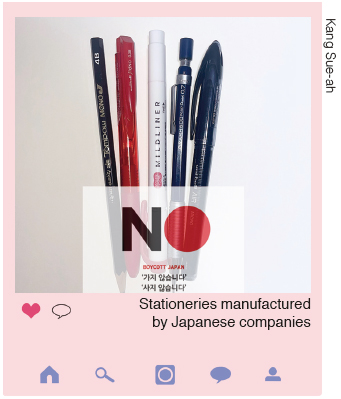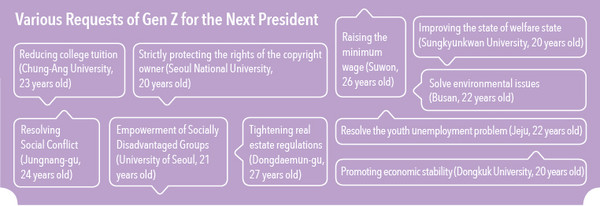The “Generation MZ” (Gen MZ), which refers to those born between 1981 and 2010, has slightly different characteristics compared to the previous generations. They differ in terms of their political inclination to consumption habits to decision-making processes. In particular, the Gen Z group, which most college students belong to, is considered more complex than any other age group. This generation is the most educated yet but is in line with the inheritance of an economy with record-low unemployment.
In the 2021 by-election for the mayor of Seoul, Gen MZ has clearly revealed their characteristics in their voting pattern. This was reflected in the outcome of the by-election, summed up by a crushing defeat for the ruling party. It was not like the last year’s parliamentary elections, in which the Democratic Party won the advantage of President Moon’s soaring popularity. At this time, Oh Se-hoon of the People Power Party outpaced Park Young-sun of the Democratic Party by more than 18 percentage points.
The Democratic Party’s approval rating was on the decline among all age groups, but the nosedive in the men in their twenties is outstanding. Until then, Gen MZ was considered the core supporter of the Democratic Party. However, at this time, 72.5 percent of male voters in their twenties supported the opposition. This result is interpreted to be due to the growing cynicism toward the scandals of the Democratic Party. Moreover, President Moon has aimed to stabilize the real estate prices since the beginning of his administration, but the performance of real estate policies has not been clearly revealed over the past four years. The regime’s judgment on the continued instability in housing prices also appears to have contributed to the decline in approval ratings.

There were drastically different tendencies among men and women. Women in their twenties supported minority parties and independent candidates by more than 15 percent. As the by-election was held after the former mayor’s involvement in sexual harassment cases was brought to light, the attitude toward gender issues seems to have affected the approval rating.
There were far more articles on the internet about the debates conducted by candidates on gender issues than on large political events such as the election of the party leader. Thus, Gen MZ has a significant influence on the media. In addition, Gen MZ is likely to be the casting vote in the next year’s presidential election, given that it shifts its stance according to the situation rather than blindly supporting one party.
Gen MZ is not just a key driver of political change. They are the generation that can change society. Even now, they have a strong influence on the economic and cultural aspects of the country. To capture their interest, accurate analysis of the characteristics of Gen MZ is needed.
Following are the key characteristics of Gen MZ.
Seek Fairness
Fairness is one of the most desirable values for Gen MZ. According to the big data platform “Some Trend” (April 18), about a million cases mentioning “fair” were uploaded on social media and portal sites last year, which means that an average of 4,300 posts discussing fairness is being posted a day. This shows that fairness has become a hot topic for Gen MZ, who uses social media the most. This is because social mobility is almost fixed, which means that moving up the ladder is impossible. It could be described by the phrase “Sticky floors at the bottom, sticky ceilings at the top.”
Those in their twenties grew up for 12 years in an environment where getting one more test question right would change their admission to college. They learned that getting acknowledged for one’s efforts is natural, just as getting one question right determined their grades. However, the reality is that only a few people enjoy the privilege, and many people do not succeed regardless of how hard they try.
Therefore, a considerable sense of deprivation exists regarding how efforts alone cannot overcome the gap between the rich and the poor. Thus, Gen MZ expresses anger if they are not properly paid for their struggle to survive in a harsh society. In particular, those in their twenties focus on equality of opportunity, excluding equality of outcomes. Gen MZ reacts most sensitively in areas such as admission, employment, and military service because these are directly related to their interests.
The desire for fairness leads to conflicts in Gen MZ, especially gender conflict. Women in this generation have raised their voices about gender-discriminating social structures through gender issues that have emerged in recent years. They recognize that they are disadvantaged in both families and workplaces as gender gaps still exist in employment and wages. In contrast, the men argue that they are discriminated against since institutional support is provided only to women. With the excessive announcement on the media about preferential treatment for women, men think our society favors women. However, the reality is different. Women are angry because, despite all those policies, nothing has changed.
In addition to fairness, Gen MZ pursues something different from the previous generation. They seek strong individuality and diversity. To be more precise, diversity is the result of seeking preferences that are different from others.
Individual lives
Gen MZ wants to distinguish between public and private life since they value their own time to focus on themselves. They prioritize their interests or values rather than being unconditionally loyal to the workplace. They also consider having a meal with the company members or company group activities uncomfortable. The individual has become more important than anything else.
Due to this characteristic, Gen MZ tends to live by doing what they love. They also want jobs that ensure high salaries like the other generations. However, there is a tendency among them to do socially valuable things or what they truly want. Even if the company is stable, has high recognition, or gives high salaries, Gen MZ can decide to leave the organization if the company’s operating method is not honest, decisions are made in a way that cannot be agreed upon, or the employees are not allowed to express their opinions. Further, some people do what they like after work without quitting. It could be an investment or some social media activities.
In 2018, “Y T Research Institute” surveyed 800 men and women in their twenties regarding their thoughts on the standard of a happy life. Of the surveyed respondents, 37.4 percent said that “doing what they want to do” is the standard of a happy life. It was the second most popular answer, following “being financially stable.” These data confirm the characteristics of Gen MZ described earlier.
Influenceable
Influenceable is another word used to describe Gen MZ. It refers to the generation that recognizes the great influence of each person on the Internet. They act based on it and make a difference in society. This is because they enjoy revealing their influence on society. They feel proud of exerting a positive influence on social media. Gen MZ, who grew up in a society with advanced communications technology, is accustomed to using social media. This is why they use social media to drive change without any reluctance.
Here are some examples of the positive influence of Gen MZ:
1. Opening an event on personal social media and providing giveaways to have more followers and attract their attention.
#birthdayevent #gifticonevent
2. Recruiting commercials and sponsorship even if they have only a few followers.
#sponsorshipopportunitiy #sponsorshipneeded
3. Stating one’s opinions about social issues.
#boycott #NoJapan #BLM
4. Sharing one’s daily life for people who will wonder about them, expressing one’s personality, and communicating with others.
#qna #Vlog
Gen MZ can have a positive influence and has brought some visible changes. In the past, the positive influence was limited to celebrities. However, nowadays, this can be realized directly by Gen MZ. They speak out for individuals, countries, humanities, and even the environment. Two examples of the influence of Gen MZ in South Korean society are discussed below.
Zero Waste Campaign
The Zero Waste campaign started to reduce the amount of waste by replacing disposable items with recyclable materials. While previous generations prefer convenient and inexpensive products, Gen MZ understands the influence of one’s actions and pursues worthwhile consumption. Therefore, the zero-waste campaign fits well with Gen MZ, who cares about the environment. To realize zero waste in everyday life, Gen MZ has popularized the “Take Courage Challenge” on social media. The pronunciation of “take courage” is the same as “in an empty container” in Korean. It is a campaign to pack food from shops in containers that were taken from home to reduce unnecessary waste generated by food packaging. Gen MZ posted photos of their participation in this challenge on social media with the hashtag #takecouargechallenge (yong-ginae challenge).

Boycott of Japanese Products

From July 2019, a movement aimed at not purchasing or consuming products manufactured by Japanese companies began in South Korea. It started as protests against Japan’s unilateral export restrictions and economic retaliation. The boycott proceeded with the slogan of “NO Japan,” which went viral on social media. Gen MZ actively propagated the boycott online by posting a list of domestic products that could replace Japanese products. This resulted in increased participation of people in the movement. The boycott had a significant effect. As sales of Japanese products declined significantly, South Korean products reflexively benefited.

As mentioned above, Gen MZ has different characteristics than the previous generations, which clearly makes a big difference in society. Their influence is crucial because they participate in different areas, from politics to the economy. Moreover, these characteristics eventually affect politics, which means that politicians need to create a society that captures their characteristics.
However, it is problematic to unite the different voices of Gen MZ assuming it as a singular inclination. As mentioned earlier, Gen MZ has been the most education-oriented society in South Korea. They have diverse ideas and interests. Even within them, countless individuals have different perspectives and learning. Moreover, Gen MZ tends to respect individuals more than any other generation and pursues diversity.
Nonetheless, discussions about Gen MZ are sometimes consumed without alternatives, depending on particular political interests. People in their twenties expect politicians to be able to understand and sympathize with them, but the politicians are at odds with each other. Rather than dismissing the problems as if youth naturally have to suffer, they should focus more on finding and solving the actual problem factors that have caused the current situation. Politicians should give young people the authority or opportunity to participate in structural issues, and Gen MZ should also be interested even in areas they want to ignore and express various opinions to get more political influence.
There is a year left before the presidential election. South Korea needs a candidate who listens to Gen MZ more. No matter who becomes the President, we hope that they are ready to listen to the voices of young people.

Sung Jung-min
sjm2572@uos.ac.kr
Kang Sue-ah
sue020324@uos.ac.kr

